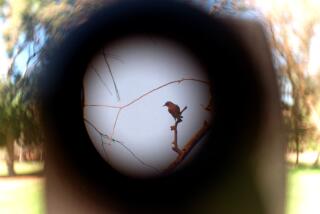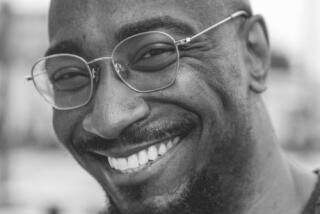Book review: ‘The Wilding’ by Benjamin Percy
It’s a relatively simple conceit — the hunting trip as suspense tale. A small group journeys into the wilderness — ball caps tilted against the sun, backpacks loaded with beer and tackle — and emerges days later changed, if not fewer in number. Benjamin Percy’s first novel, “The Wilding,” manages to nicely subvert this setup while setting up a tense back-and-forth narrative between those who’ve taken off and those who’ve stayed at home.
The former are three generations of Caves men. Justin Caves is an English teacher at a high school in Bend, Ore., where whole swaths of land are being rapidly apportioned into residential and commercial developments. His father, Paul, is an aging pragmatist with rough hands and a physical presence that has never ceased to intimidate. The owner of the Paul Caves Hand Hewn Log Cabin Co., he’s the kind of guy who, upon noticing logs from his woodpile missing, fills a hole in a log with gunpowder, and makes sure to send flowers to the hospital days later when his neighbor’s living room explodes.
It’s Paul’s idea to bring Justin and his bookish 12-year-old son, Graham, on one last hunting trip into the Ochoco Mountains east of Bend, to Echo Canyon, the very place where Paul took Justin as a child and the very place where a brand new development — timbered lodge, 300 lots, golf course, paved bike trails — is about to emerge. For Paul it’s as much a form of catharsis as it is a trip to put some hair as it were on his grandson’s chest. After all, it’s Paul’s company that has been contracted to build the cabins.
For Justin, the trip is a chance to spend bonding time with his son and to gain perspective on his crumbling marriage to Karen, who half a year earlier suffered preeclampsia and the stillbirth of their second child. A line “has come to run down the middle of their bed” and dinnertimes have become caustic affairs. Karen does not like Paul’s influence over Justin and only reluctantly allows Graham to join along on the outing. For her, it’s a few days to be alone with herself — and to figure out whether her marriage can be saved.
As the trio sets off into the mountains, they will have to contend with a number of unforeseen circumstances involving both humans and mammals (read: bear). But back at home, Karen may not be as safe as she imagines, thanks to the increased attentions of hot-shot land mogul Bobby Fremont and Brian, a local locksmith and Iraq war veteran with a mental state that tends toward the animalistic.
Percy, whose previous story collections include the well-received “Refresh, Refresh” and “The Language of Elk,” grew up in the Bend area, and he peppers landmarks throughout. However, one doesn’t have to be a local to understand the roiling changes that have engulfed the Pacific Northwest — the clear-cutting of ponderosa and lodgepole pines, the duality involved in being a member of a community that is changing with the times. It is to Percy’s credit that both Justin and Paul have one foot in the past and one firmly in the present. Justin enjoys the convenience of Subarus and Starbucks, and Paul is grimly aware of his place in the new economic ecosystem. If he says no to the Echo Canyon job, “then another company gets it and the job gets done anyway. The other guy gets money in the bank, gets his name out there, gets the call the next time a job comes up.”
Percy also preempts any worries of comparison to James Dickey’s “Deliverance” — a comparison unavoidable in such matters of men and wilderness — with a quotation from Dickey right at the book’s beginning. Thankfully, fans of the 1970 novel need not fear an overwhelming sense of déjà vu: Dickey’s quartet have only one or two chances to turn back before they are immediately cast into a waterslide of bad, bad news. Justin, Paul and Graham have many chances to cut the trip short — plenty of opportunities to roll up their tents, start up the truck and ease back onto Highway 26. That they do not and that Percy winds subtle family dynamics nearly to the breaking point among father, son and grandson is what keeps this novel’s pages turning. If it’s a thriller you’re after, “The Wilding” doesn’t disappoint, taking a story as old as the woods and fashioning it into something a bit sleeker and more psychological — a bit closer to where we live.
Ducker is a writer living in Los Angeles. His writing has appeared in Bookforum and The Believer.
More to Read
Sign up for our Book Club newsletter
Get the latest news, events and more from the Los Angeles Times Book Club, and help us get L.A. reading and talking.
You may occasionally receive promotional content from the Los Angeles Times.






